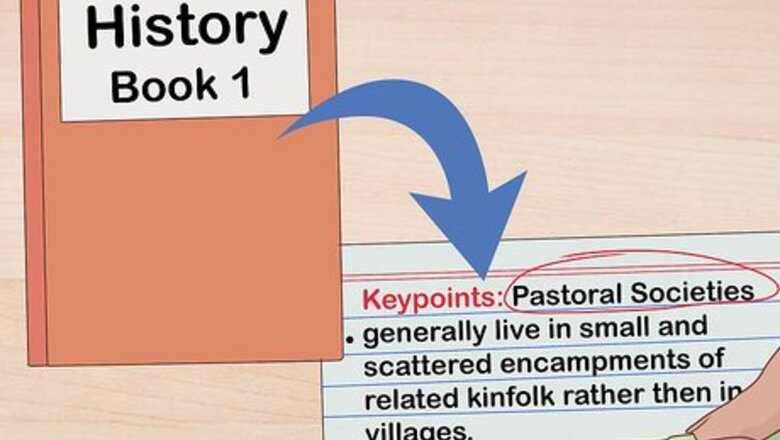
views
Using Memory Techniques

Break the material down into small pieces. It’s easier to process and remember information if you break it up into bite-sized chunks. Instead of trying to memorize an entire chapter of your textbook, focus on one short section or key piece of information at a time. For example, if you’re trying to remember vocabulary for a language class, don’t try to memorize more than 7-8 words at a time. If you’re studying from a textbook, it can be helpful to work with the structure of the book. Textbook chapters are usually divided into shorter sections that each provide a manageable amount of information. Focus on understanding and remembering one section before moving on to the next.

Switch between different topics. It can be helpful to alternate between studying different subjects, so that your brain compartmentalizes the information more effectively. Switching between topics that are very different from each other can help keep your brain from getting bogged down with trying to remember too much about one subject (or 2 very similar subjects) at once. Additionally, switching between topics will help you avoid getting burned out on any one topic. For example, memorize a poem, then move on to studying some algebra rules. Try spending about 50 minutes on each topic, then take a break for about 15 minutes before going on to the next one. Taking breaks will boost your productivity and help you concentrate.
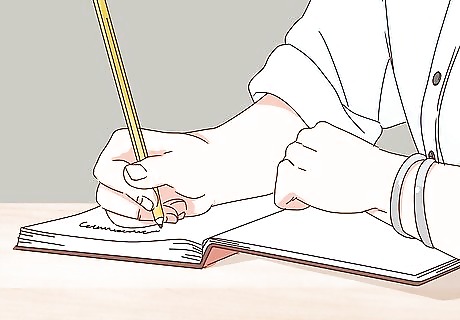
Take notes. As you’re listening in class or reading your text, write down important pieces of information. Don’t write down every word you hear or read. Instead, summarize key concepts. This will force your brain to process the information and condense it to its most important elements. If you can, take notes with a pen and paper. Writing notes by hand engages your brain in a different way than typing on a keyboard, and makes you take a little more time to think about what you are writing down. If you like to doodle while you take notes, that’s great! Doodling can help you pay attention and retain information.
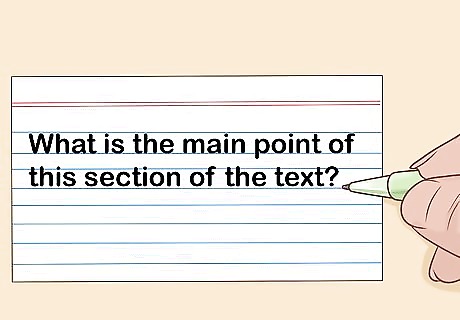
Test yourself. As you study each section of the material, take breaks to quiz yourself. You might do this by making flash cards, writing study questions for yourself, or doing the exercises or knowledge checks that are built into your textbook. If you’re studying with a friend, you can quiz each other. Quizlet can be a great help for quizzing yourself, either alone or with a friend. You can create your own digital flashcards based on your course material, or you can use flashcards prepared by other members. One way to test yourself is to ask yourself basic questions about the material as you go. For example, “What is the main point of this section of the text?” Self-quizzing not only helps you get a better idea of how well you understand the material, but it also forces your brain to work a little bit harder to remember. EXPERT TIP Joseph Meyer Joseph Meyer Math Teacher Joseph Meyer is a High School Math Teacher based in Pittsburgh, Pennsylvania. He is an educator at City Charter High School, where he has been teaching for over 7 years. Joseph is also the founder of Sandbox Math, an online learning community dedicated to helping students succeed in Algebra. His site is set apart by its focus on fostering genuine comprehension through step-by-step understanding (instead of just getting the correct final answer), enabling learners to identify and overcome misunderstandings and confidently take on any test they face. He received his MA in Physics from Case Western Reserve University and his BA in Physics from Baldwin Wallace University. Joseph Meyer Joseph Meyer Math Teacher Become an active learner. Learn from your mistakes in order to confidently tackle new lessons. Before jumping into advanced topics, make sure your skills in basic concepts are up to scratch. Utilize online resources and interactive exercises that provide instant feedback to solidify your understanding.

Space out your review sessions. When you’re trying to remember something, repeated exposure is important. This method works best if you give yourself enough time between reviews that you start to forget what you studied. Reviewing after a little time has gone by flexes your memory muscles and helps you learn the material at a deeper level. When you’re spacing out your review sessions, keep the intervals short at first, then gradually increase them. For example, if you studied something one day, sleep on it and do a little review the next day. Test yourself a couple days later, and then again a week after that. Try a study timer app like SuperMemo or Ultimate Study Timer to help you schedule your study intervals.

Create memory cues, called mnemonic devices. One of the easiest ways to access memories is to create associations that trigger those memories. That might mean using an acronym to remember information (for example, ROY G. BIV for the colors of the rainbow), using a pun or word play, or creating a distinctive mental image. The most common mnemonic devices are creating acronyms that represent the words you're trying to remember, making an acrostic sentence where the first letter of each word represents what you're trying to remember, and using rhymes to remember. However, you can also use image association, especially if you're a visual person. Music is also a powerful memory trigger, so putting the information to a melody can be very helpful. There’s a reason countless generations of kids have been taught the alphabet in song form! Your memory cue doesn’t have to make sense to anyone but you. In fact, the weirder and more specific it is, the better. For example, if you’re trying to remember the ancient Greek word hepomai (“to follow”), you might picture a cool cartoon cat singing “I’m hep! Oh my! Everybody follow me!”

Explain the material to someone else. Teaching is one of the best ways to learn. To be able to explain something, you must be able to understand it yourself. You have to summarize and express the material in a way that is clear and understandable to another person, and doing so can help you absorb and understand the material better.
Establishing Good Habits

Give yourself plenty of time. If you really want to build enduring memories, you need plenty of time to understand, process, and review the information. Give yourself at least a couple weeks to study before a test. Last-minute cramming is ineffective at helping you retain what you’ve learned, and will leave you feeling tired, stressed, and overloaded with information.

Sleep on it. Most people need 7-9 hours of sleep every night to be at their best. Getting enough sleep not only gives you energy and helps you concentrate, but it can also help you learn and remember. Your brain processes new information while you sleep, so you may find that you understand those difficult concepts better after a quick nap or a good night’s rest. Get the most out of your sleep by practicing good “sleep hygiene”: Don’t nap for more than 20-30 minutes during the day. Avoid using stimulants, such as caffeine or nicotine, 6-8 hours before bedtime. Having more than 1-2 alcoholic drinks in the evening can also disrupt your sleep. Exercise at least 10 minutes a day to improve the quality of your sleep. Avoid eating evening meals that might cause heartburn or indigestion, such as spicy, acidic, or fatty foods. Develop a regular, relaxing bedtime routine. Put away your computer or smartphone, do some meditation or light stretching, and take a warm shower or bath. You might also try reading to help you fall asleep. Set aside about 30 minutes before bedtime each night to unwind.
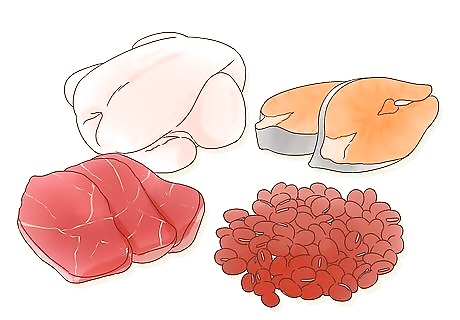
Eat well. Eating a healthy diet can help give you the energy you need to concentrate and retain information. Eat lots of lean proteins (fish, lean meat, and leafy greens), whole grains, fruits and vegetables, and foods with healthy fats (like vegetable oils, fish, and nuts). Stay hydrated by drinking water throughout the day. Some healthy fats, like DHA, may actually improve your memory. Eat plenty of fish, or take fish oil supplements to get more DHA in your diet.

Take breaks. If you try to force yourself to study for too long in one sitting, you’ll soon start to nod off, or find your mind wandering. To make your studying more manageable and effective, try studying for an hour at a time. Take 5-15 minute breaks between study sessions to snack, stretch your legs, or put your head down for a quick catnap.
Finding a Good Study Environment
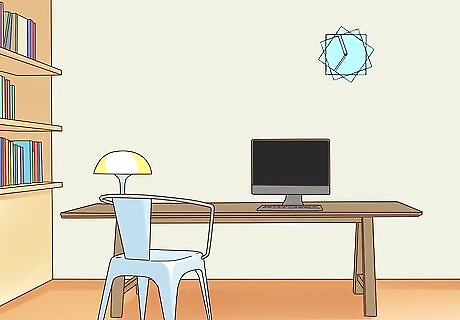
Find a comfortable study space. If you’re not comfortable, you’ll have a hard time concentrating on what you are studying. Find a space that is tidy, private, and comfortable, and that gives you plenty of room to spread out. If your preferred space doesn’t have a comfortable chair, consider bringing your own cushion with you. Good study spaces could include a desk in your room, a study carrel or cubicle in your school library, or a table in a quiet coffee shop.

Study in a quiet place to concentrate well. It can be very hard to concentrate with a lot of background noise. Find a place to study where you won’t be distracted by people talking, construction sounds, or other people’s music. If you can, put on a little quiet, non-distracting background music to help drown out bothersome noise. If you have to study around other people, such as family or roommates, let them know in advance that you need to be left alone for a certain period of time while you study.

Make sure there’s plenty of light. Dim or flickering lights can distract you and make it harder to see what you are studying. If you are studying during the day, pick a spot with plenty of natural light. For nighttime study, or if you don’t have access to a sunny window, choose a spot with a full-spectrum fluorescent light.
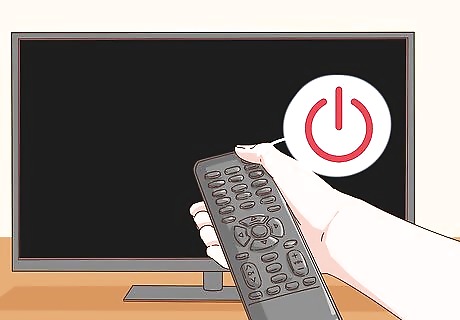
Stay away from tempting distractions. It’s easy to get sidetracked when you have easy access to social media, games, or things to watch while you’re studying. Try to work in a room without a TV, or at least keep the TV off while you are studying. If you can, turn your phone off or put it on airplane mode to reduce the temptation to browse social media. If you’re working on your computer, try a productivity-boosting browser extension like StayFocused to keep you away from time-eating websites.

Avoid studying in bed. If you get too comfy, you may find that the temptation to nod off is overwhelming. If you’re feeling sleepy, it might also be best to avoid studying on a couch or in a cozy armchair. Sit at a desk or table instead. If you come to associate being in bed with studying, this can also make it harder for you to fall asleep there at night.




















Comments
0 comment